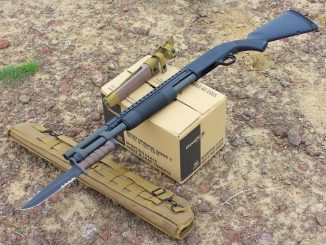
The U.S. Navy’s experimental rail gun is getting new upgrades to make it fire more powerful shots, and fire them faster. It’s the latest bit of progress on this still-landlocked weapon, but when and where it actually would be installed on a warship is not clear.
Defensetech reports the Navy wants to push the Office of Naval Research’s prototype railgun from a science experiment into useful weapon territory. The goal, according to Tom Beutner, head of Naval Air Warfare and Weapons for the ONR, is ten shots per minute at 32 megajoules. How much power is that? One way of looking at it is that a .22 bullet has 1,000 foot-pounds of force at the muzzle. A 32 megajoule railgun shot: 23,601,988 foot-pounds.
The railgun works by using extremely high electrical currents to generate magnetic fields capable of accelerating a projectile to speeds of up to Mach 6, more than twice as fast as existing projectiles. The railgun has a range of more than 100 miles. It fires projectiles that destroy targets not with high explosive, but by smashing into them at hypersonic speeds.
However, we’ve been waiting years for the railgun to join the fleet, and part of the delay has been because the Navy is making the railgun more durable. The raw kinetic power unleashed in firing the railgun is rough on the weapon’s parts. As PM wrote in 2009, the year the railgun was delivered to the Navy, “A few shots can dislodge the conducting rails—or even damage the barrel of the gun.” That wasn’t a weapon ready for prime time. Now, as Hope Hedge Sack reports, the Navy thinks it can get to the point where the launcher core, which previously wore out after tens of shots, could fire more than 400 shots and a barrel can last up to 1,000 rounds.
So far only the Zumwalt-class destroyers, each capable of generating 78 megawatts of electricity, are the only surface ships with enough juice to handle railguns. The big question is, when are the Zumwalts going to get their railguns? The Zumwalts were built from the ground up to power these machines, but they also were cut from 32 ships to just 3. They’re armed—for now, anyway—with 155-millimeter long range guns that would probably have to be removed to install railguns.
The ships won’t receive their railguns until the Navy decides the weapons are ready to go to sea and has the money to do the upgrade. That means waiting for several years while slowly upgrading the weapon to survive the rigors of combat and the sea. While everyone would like the railgun to become operational sooner rather than later, problematic technologies like the Navy’s electromagnetic EMALS aircraft catapult system and the robotic mission modules of the Littoral Combat Ship show the perils of relying on a high-tech system before it is good and ready. For now, the railgun remains landlocked in Virginia.
Here’s a video of the railgun undergoing testing:

[pt_view id=”517b65fj16″]





Be the first to comment